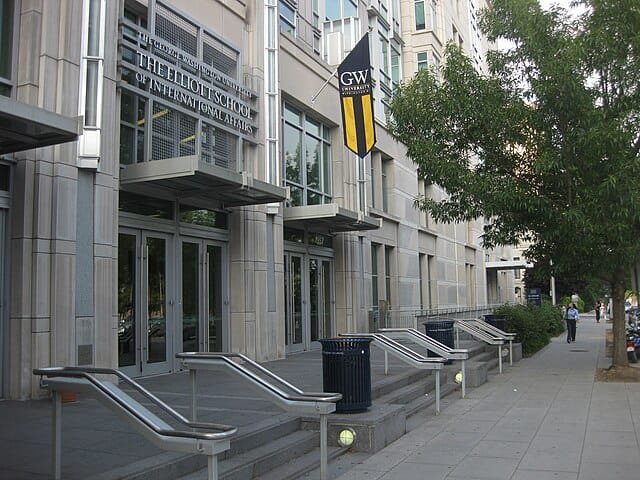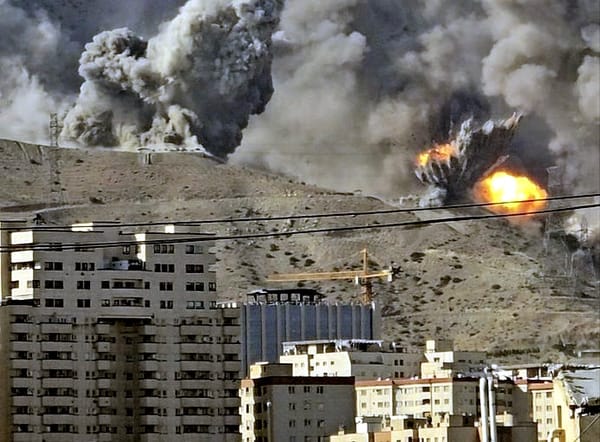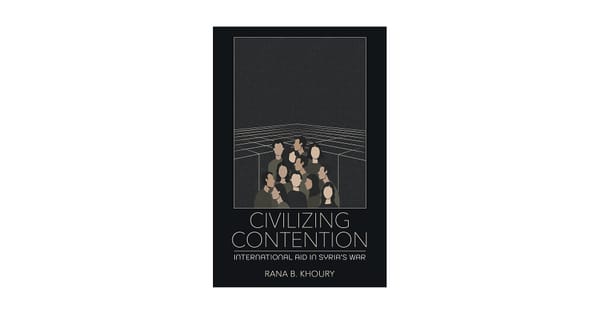What it's like to be a Middle East Studies professor in 2025

Basically, it sucks.
Last week, Tuft's Dan Drezner and my GW colleague Dave Karpf published really good pieces on what it's like to be, respectively, a dean of international affairs and a professor of political communications in the fall of 2025. Karpf observes that "Most of the headlines I see about higher ed these days focus on the AI problem. For me, the much bigger issue is the authoritarianism problem." Drezner points out that "Trump is trying to weaken universities by cutting their financial legs out from under them... once Trump is done with the Ivy League he will aim his weaponized government at any institution of higher education that has has an endowment he can threaten."
Try being a Middle East Studies professor.
When I started writing this post, I was going to recount all of the horrors of the last year – the graduate students arrested and threatened with deportation for obviously constitutionally protected speech; the government choosing its targets based on lists compiled by highly partisan pro-Israeli organizations like Canary Mission and Betar; the DOJ edicts declaring one institution after another as in violation of Title VI for alleged antisemitism without any serious investigations and even as the administration removes protections from every actual at risk student population; the extortion of one institution after another demanding cash payments ($500 million from Harvard! $1 billion from UCLA!) and far-reaching state interference in academic affairs (demanding the dissolution of Middle East centers, adoption of the IHRA definition of antisemitism, hiring of pro-Israeli faculty). But when I ran it by someone, she just rolled her eyes. Everyone knows. They might not care, but they know.
And that's the thing. Pretty much everyone can easily see that the canceled NSF or NIH grants for biomedical research have nothing to do with the trumped up charges of antisemitism used to arbitrarily withhold them. But too many faculty and administrators from those "unrelated" fields seem all to willing to concede that just maybe those who study the Middle East just might be antisemitic, or at least can't be bothered to find out. They want their institutions to fight to protect their "apolitical" work, but often don't extend that fighting spirit to the defense of the disciplines and scholars directly targeted by a lawless government seeking to impose an official orthodoxy over knowledge production. Put bluntly, too many in higher education seem happy to throw us to the wolves if they could just get their research lab back. And those same people will be quite happy afterwards to keep their mouths shut about anything which might offend the ideological commissars standing over their shoulders as long as the funds keep coming. They seem to think that someone they will be spared if only they hand over the "bad guys" to the feds. (They won't be.)
It's the same dynamic we saw with the wholesale and almost immediate abandonment of every stated commitment to free spech by the vast majority of university and college administrators over the Gaza protests. It's heartening to see the full-throated support from the AAUP and from a lot of prominent voices, but it's not enough. It is noteworthy that the Middle East Studies Association (MESA) has been one of the only academic associations to really step up to meet the moment – documenting the many abuses, writing letters in support of and privately advocating for targeted faculty, joining the AAUP lawsuit against student deportations, and more. The membership of MESA has much longer experience with these ideological wars than do most of the mainstream of their various disciplines, sees the connections between the attack on Middle East Studies and the broader attack on critical race studies and other forms of critical scholarship, and is less afraid to fight back. It has been truly disheartening to see how few of the major disciplinary associations have been willing to join the fight. (Have I mentioned that I'm not going to the APSA annual conference this year?)
Personally, I am excited to get back into the classroom this fall. I've been away for personal reasons for the last three semesters; the last time I taught International Relations of the Middle East was in the fall of 2023, and a lot has changed since then. I love teaching, I have a supportive leadership at the Elliott School, and I love teaching this graduate level course in particular. Elliott School students are brilliant, serious, and eager to engage on difficult issues in international affairs. The first line of my course description on the new syllabus is "This is an exciting time to be studying the International Relations of the Middle East." It is. At the same time, it's striking that enrollments for the course are noticeably lower than in past years – perhaps because of the Trump-inflicted nationwide collapse in international students, perhaps because of the Trump-inflicted collapse in government and government-adjacent jobs in international affairs, or perhaps because the last two years have made students (especially international students at risk of deportaiton) fearful about taking a course that touches on Israel and Palestine.
I hope that it's not the latter. It has never been more important for students to seriously and rigorously study the history and politics of the Middle East, including but not limited to Israel and the Palestinians. The intensity of public discourse and political mobilization makes it pretty clear that students want to learn about these issues. From what I've seen, it isn't students who shy away from serious discussion of these issues – it is powerful elites enraged by the protests against Israel's war on Gaza and determined to restore by force a narrative and political consensus that has collapsed under the weight of genocide. The story of the last two years has been that the more complete the collapse, the fiercer the repressive response – one which goes beyond the prosecution of individual protestors to the delegitimation of scholarship on the area and intense personal, professional, and legal attacks on faculty and graduate students who study it.
So what is it like for Middle East Studies faculty in fall 2025? Over the weekend, I asked my colleagues how they felt going back to the classroom for the new semester, and the answers were pretty much what you'd expect: "awful", "terrifying", "exhausted", "drained", "apprehensive". Most approach this semester with an overwhelming sense of dread and foreboding. Several described opting out of teaching Middle East politics courses, calling them "terrifying... not worth the stress despite the need and demand for the course." It's horrible for students too, with international students terrified of losing their visas for expressing any views of the Middle East which contradict official ideology – in protests, on social media, in opeds, and probably even in class. I'm sad to say that this is exactly the fear and suffering that their attackers hoped to produce.
Suffering, they have caused – but not despair. The overwhelming majority of Middle East faculty I heard from haven't given up – not even close. Despite their fears and the extreme pressures they face, they continue to be determined to teach their subjects, publish their research, and fulfil their pedagogical and scholarly mission. Faculty understand the stakes of the moment, feel firsthand the hunger of most students for knowledge and understanding, and carry on against heavy headwinds. Intimidation and pressure have not succeeded in silencing faculty or breaking the field. One described himself as "determined, needed, and doing my job." As another put it, "our students need us – our expertise and our empathy – now more than ever." As one of my colleagues mentioned, faculty rarely get credit from their administrations for the fires that don't ignite, for the classrooms that don't explode into acrimony and polarization, for the students who come away with a better understanding of the subject.
As with every time we have surveyed faculty on these issue, I heard story after story about harrassment of Middle East faculty by other faculty, by administrators, by external agitators, by politicians, by media, and even by scalp-hunting students. All of this is deeply corrosive of the academic mission. The classroom should be a protected space of intellectual inquiry, where difficult and contentious issues can be explored in a rigorous way from every direction. How can faculty do that effectively if they fear that a student would send a clip of my intentionally provocative comment to some activist organization to circulate on social media in hopes of causing trouble? How are they supposed to teach when any disgruntled student can put their career at risk with an anonymous comment alleging (with no proof required) antisemitism in the classroom? And, on the flip side, how can faculty coerced to teach a government-approved curriculum produce anything close to a college-level educational experience?
Look. It's hard teaching an intensely controversial subject with little expectation of support from one's leadership, with hostile external actors constantly poised to attack at the least pretext, and with the rapidly accelerating shift from harrassment and abuse to formalized state repression. But this isn't just the normal whining. Everyone who teaches on the Middle East has dealt with this kind of abuse and harrassment for many, many years. But what's happening now is different.
I don't think most people quite understand the extent to which the academic study of the Middle East has been criminalized – not just criticized but rendered illegal and subject to extreme state sanctions. The IHRA definition of antisemitism adopted by Columbia, Harvard, and others equates criticism of Israeli policy with antisemitism. That alleged antisemitism (i.e. criticism of Israeli policy or even just protesting the horrors of Gaza) has, in turn, been the grounds for frozen grants, Department of Justice investigations and extortion demands on university after university. The lawlessness of this can be seen in the recent experience of Haverford, which had a civil lawsuit alleging antisemitism and discrimination tossed by a judge on first amendment grounds only to receive notification of a Justice Department investigation of the same charges. In states like Florida, Ohio and Texas, new state laws governing 'divisive content' criminalize any honest teaching about the Middle East – in some cases inviting students to anonymously report professors for alleged ideological offenses.
I have a hard time coming up with comparable examples of universities (and everyone else) being compelled to stick to a government-imposed ideological party line on anything.... at least in America. I never thought I would see so many ostensibly liberal intellectuals willing to go along with it. As with the unseemly rush to abandon DEI programs and initiatives, far too many institutions have hastened to comply in advance with effects that will linger long after the initial charges are ruled illegal or offical investigations quietly abandoned. Our colleagues in the physical sciences who have seen their labs shuttered and research programmes disrupted in ways that can't be easily put back together even if the frozen funding is returned should be able to understand this.
So yeah, it's not a great time to be teaching about the Middle East. But, at the same time, it's an exciting time to be thinking about the Middle East – and that makes it an exciting time to be teaching about the Middle East, if only it is permitted. We've seen seismic changes in Israeli-Palestinian and Israel-Arab relations, wars across the region and rapidly shifting balances of power, autocratic regimes under ever greater economic and political pressures, the decline and evolution of Islamist movements, an historic attempted transition to democracy in Syria with the highest of stakes, new transnational advocacy movements, unprecedented interventions by international legal institutions, and so much more. Students want to know about these things. A healthy academy would be rushing to hire as many faculty as possible to meet that demand. Right now we're a long way from a healthy academy, or a healthy American polity. But it's important to keep fighting to get there.
Thank you so much for subscribing to Abu Aardvark's Ghost and the MENA Academy (sounds like a killer indy band, right?). Moving from Substack to Ghost raised the costs of maintaining the blog considerably – Ghost's price tiers are based on the total number of subscribers. I rely on my core supporters with paid subscriptions to keep it going, and would deeply appreciate more. So I'm running a 25% off annual subscription promotion for the new academic year. I know things are tight for everyone in these terrible times, but if it's possible for you to join the club it would mean a lot. Thanks!



